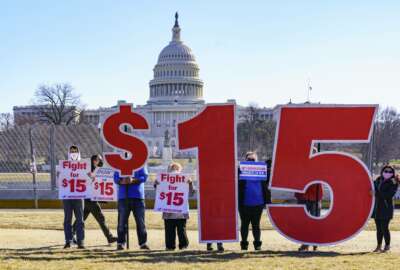

Congress has been unwilling to go along with a national minimum wage of $15 an hour. The Biden administration imposed one for the federal workforce and for...
Best listening experience is on Chrome, Firefox or Safari. Subscribe to Federal Drive’s daily audio interviews on Apple Podcasts or PodcastOne.
Congress has been unwilling to go along with a national minimum wage of $15 an hour. The Biden administration imposed one for the federal workforce and for contractors. The Federal Drive with Tom Temin spoke with someone who thinks such a mandated wage could result in reduced services and flexibility for the government itself: Rachel Greszler is a research fellow in economics at the conservative Heritage Foundation.
Interview transcript:
Tom Temin: All right, so the $15 minimum wage for federal employees and for contractors, what’s your take on the effects that could have?
Rachel Greszler: Well, I think this is actually one situation in which the federal government is not going to be immune from the same effects that the private sector experiences, whereas a mandated minimum wage, $15 an hour here, is going to force them to have to make some tough decisions, particularly in the short term, because their current fiscal year budgets are already limited by what Congress has allocated to them. And so they’re going to have to make some of those choices that private sector businesses do. Normally, that means you lay off workers, you get rid of the least experienced ones, you cut hours, you cut health care benefits or retirement benefits, some places go out of business entirely. So the agencies, they’re limited, they can’t simply fire federal workers, that usually takes about a year and a half, they can’t change the benefits packages. So they’re probably going to have to cut some services. And the department that is going to be most impacted by this, 84% of the employees that will be subject to these higher wages, are in the Department of Defense. So they’re going to have to make some tough decisions about squeezing those budgets. And this could compromise their ability to maintain their readiness in a time that’s problematic.
Tom Temin: Well, this 84% of the people that would be affected in Defense Department, what’s the nature of the people that are at that minimum wage level in the first place? What is it they do, generally?
Rachel Greszler: This is primarily service-oriented jobs, think about the janitors on the bases and things like that. And it’s not necessarily even people that are in the Washington, D.C. area where we have a higher cost. So these tend to be lower wage jobs, they’re often jobs that are stepping stones, it might be the people who have just started out, but $15 per hour in the federal government is not the same as $15 per hour in the private sector, because federal employees actually enjoy extremely generous benefits packages. And the Congressional Budget Office has done a study and they said that for those individuals who are federal employees that don’t have any more than a high school diploma, they actually receive twice the level of benefits packages, as their private sector counterparts. So really, $15 per hour here translates into between $45,000 and $55,000 per year in compensation for these federal workers who are often performing lower level service jobs.
Tom Temin: And you mentioned it takes a year and a half to fire someone, but that would be for cause or for performance issues. If an agency is unable to make a payroll, I guess it could lay off people for economic purposes. And that would not take a year and a half. Do you envision that happening?
Rachel Greszler: It’s possible; they sometimes have done a reduction in force. The problem with that is that when that happens at the federal level, it just tends to be the unions that get to dictate who gets laid off. And it’s not based on productivity here. And so that gets to the issue of the federal government doesn’t really have a productivity-based pay scale, people’s wages don’t reflect what they are actually contributing. And that’s the problem with the whole structure here, is it’s great when people receive pay increases because they become more productive. But if you’re simply paying somebody more to do the exact same thing, that simply leads to inflation. And so while this executive order is for a limited sector of the economy, federal employees and only a small portion of them will it actually impact, overall raising wages, raising the mandated minimum simply leads to inflation. And we already saw that happen with misguided COVID-19 policies that paid people more to be unemployed than to actually go to work. And so what did that do? It made employers increase the amount of wages that they paid for entry level positions. We saw McDonald’s offering $15 an hour, $1,000 signing bonuses, all of these things. And so yes, workers have received above average pay wage increases, but their real pay is actually declining. They can purchase less because the pay raises have led to inflation. Sixty percent of the cost of goods and services is labor. And so we’re all experiencing the negative impacts of having to pay people more to do the exact same thing, instead of having productivity based wage increases which help everybody.
Tom Temin: We’re speaking with Rachel Greszler. She’s a research fellow in economics, budget and entitlements at the Heritage Foundation. And what about the $15 minimum wage for contractors? I mean, at the professional services level, there’s probably nobody priced out on a contract at that level. It would seem like this would affect more of the same types of lower level types of services, landscaping, food service and so on that are often contracted out?
Rachel Greszler: Yes. And so that’s exactly the point there, is that it’s getting at the lower skill entry level jobs, and it’s raising the cost there. And so it’s forcing taxpayers to simply pay a higher price than they need to for things. But it does have some spillover impacts, too, because we’re often talking about large organizations that are providing these services. And if they can’t pay workers differently based on whether or not they’re on a federal contract or they’re not. And so it really leads to wider spread wage increases, and therefore more widespread price increases across the board.
Tom Temin: The rule is not just for labor pursuant to a federal contract, but for that company, if it has any federal contracts, correct?
Rachel Greszler: Correct. And then you get into the issue of if the federal government kind of extends its tentacles into all these different areas of society where it has contracts, they’re kind of able to dictate a large portion of the compensation packages of workers across the board. But I think that that’s what’s particularly troubling now is that unions act as cartels, and we’re seeing the government kind of creating ways in which they will only pay for things if they are performed by unionized labor. That’s simply driving up the costs. And so it’s not only within the federal workforce, it’s not only within federal contractors, but it’s getting out into this trillion dollar infrastructure package, that now we’re being told this can only be performed by unionized labor, which all that does is drive up the costs and limit the supply of it.
Tom Temin: But I guess the administration would argue, well, that’s the point, we care less about the costs than about the fact of the benefits that this gives to, as they perceive it, society. And unions, the people that gave us the weekend.
Rachel Greszler: Yes, and that’s where we’re seeing though, that this argument falls apart. When they say we want to increase wages, because it’s the right thing to do, people should be able to have a, quote, living wage, we all agree that higher wages are a good thing. And we want people to be able to earn them, but you can’t artificially impose them. Because all that does is lead to inflation. And that inflation has actually left workers with lower wages. Yes, their paycheck looks higher, but it buys them less at the gas station and less at the grocery store. And so just the simple economic reality of this is you can’t raise wages by legislation or by fiat. The way that people get higher wages is by becoming more productive. And that’s through things like not double taxing investment through letting people work the way that they want to. And that’s the opposite that we’re seeing from the current administration in terms of their agenda. They would rather either force other people to pay the price of something, say we’ll have a government subsidy for it. Well, that’s not reducing the cost. It’s reducing what somebody pays for it, but it’s just making somebody else pay for it. Or we’re going to artificially increase wages here. In the end, somebody’s paying for all those things. And what is the better solution is saying “How do we help people become more productive in this process?”
Copyright © 2025 Federal News Network. All rights reserved. This website is not intended for users located within the European Economic Area.
Tom Temin is host of the Federal Drive and has been providing insight on federal technology and management issues for more than 30 years.
Follow @tteminWFED


